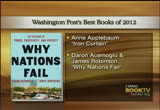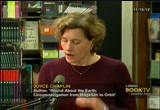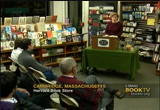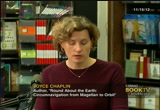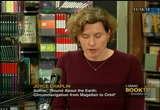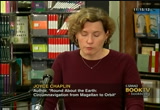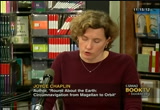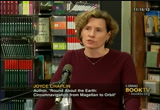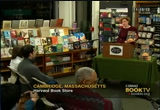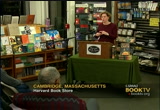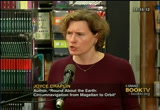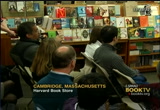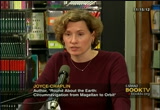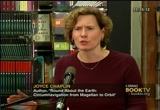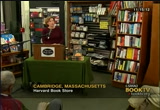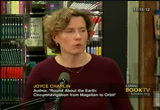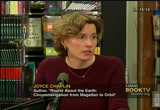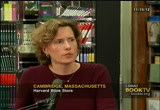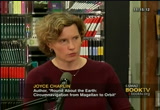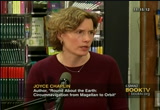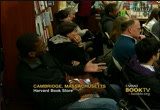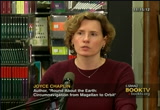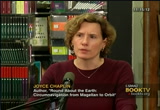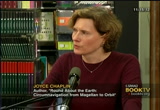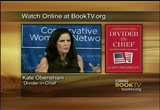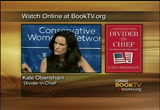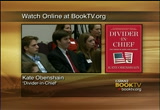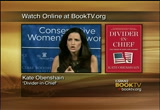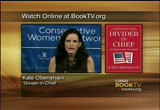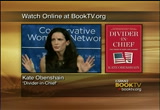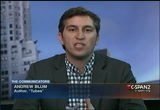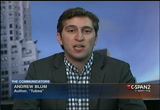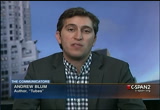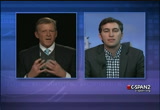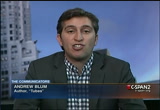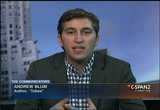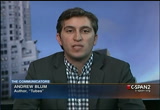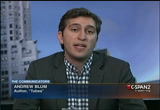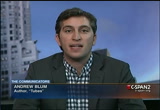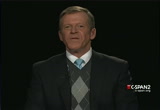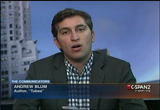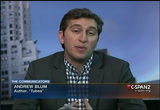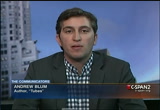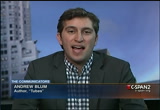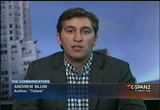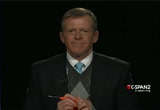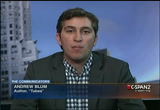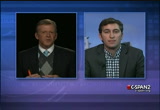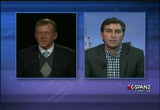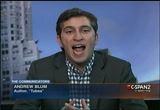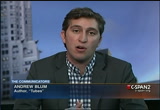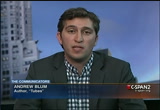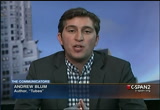tv Book TV CSPAN December 24, 2012 7:00pm-8:30pm EST
7:00 pm
7:01 pm
bookstore, to c-span, to my publisher, simon & schuster and to all of you for joining me this evening. i am only going to speak for about 20 minutes and i am going to jump right in. i found this book in the middle of the atlantic ocean. six years ago in st. george's bermuda, i embarked on a 140-foot sailing ship the education associations as sz -- i would be at sea for three weeks away from telephone internet and physical libraries yet i was in the middle of the research project on benjamin franklin the required me to read material and friend so i decided to use my time at sea to read a novel in that language. the book i chose is a small paperback edition of jules byrnes of around the world in 80 days first published in the newspaper serial in 1872. when i wasn't on watch or otherwise busy on on the ship i
7:02 pm
slowly made my way to the book. by french was good enough to my surprise but i actually enjoyed the story and as a historian i appreciated its period details especially the nature of the protagonists they englishman racing around the world. and has remarked offhandedly travel services at could take a person round the globe in a period of 80 days. prove that he challenged him and he is off. that 80 day measure was only conceivable by the late 19th century and the age of sales getting sails getting around the world have taken months or even years. the speed of my sailing ship would have -- it was the invention of steam power but the creation of regimented european empires around the globe, the opening of the suez canal and the emergence of commercial travel services that together made it just possible by the 18 70's to do the global circuit in 80 days. the second thing that impressed me about the story was how the
7:03 pm
material developments that sped up global travel were part of the dramatically increased use of natural resources. when he leaves london he takes his new valet pass part two. the two-man border night train which is scarcely departing london brent he let out a cry of despair. in a rush my state of confusion i forgot to switch off the gas lamp in my bedroom. well my dear fellow he replied coldly, you will be paying the bill. the gasland is a novel's running joke. true, it's only a small part of the journey's total cost but with present-day readers realize the joke is on us. we are notoriously the first generation that has realized with the planetary bill for centuries of burning fossil fuels is going to be. in fern's area coal was a costly but essential part of modern progress. steam-powered exploit sat at the height of the european imperialism represents the phase
7:04 pm
of the past that truly is history meaning over and done with. airplanes have replaced a coal burning engines and ships that hurtle fog around the world, empires are protected some people including fog at the expense of others have been replaced with other political regimes. it's not difficult across the surface of the world in 80 days though you can fly around in our city can afford the ticket and get the password and the visas. when i returned from sea, back on land, i looks for histories around the world travel. there was none so i wrote one. now, i very quickly decided early on in the project that there was no point in trying to document all of the circumnavigation's that existed. i didn't want to write an encyclopedia. i wanted to explain why circumnavigation is distinctidistincti ve, why do we have the term around the world or circumnavigation? what do these mean? white is going around the world
7:05 pm
matter in a the broader scheme of things? it shows how human beings have been thinking for themselves on a planetary scale for a long time for nearly 500 years. this is really significant. we think a planetary consciousness is recent, something developed in modern times, something we have the people in the past didn't and we especially associate this realization of things on a planetary scale with their ongoing environmental crisis which we think of as unprecedented. but the planetary consciousness that may go along with it may not be unprecedented. circumnavigate her ers for a very long time were by definition not only thinking of themselves in relation to the entire planet, but doing something in relation to it by going around it. circumnavigation is in fact the oldest human activity done on a planetary scale and quite remarkably 16th century sailors did it first.
7:06 pm
so, in this book, i define around the world travel as a geo-drama. from the greek for earth, gaia and action, drama perked within the european conflict the first navigation there was an established tradition of considering the world as a sphere. this was an ancient greek idea sustained through roman antiquity of the renaissance and most famously in shakespeare's all the world is a stage. it was a metaphor but around the world travelers made it a reality by presenting themselves with actors on a stage of planetary dimensions. over time, circumnavigation would be represented as dramatic entertainment first in print and then on stage and later in the film. geo-drama is different than geography, meaning depictions of the year if made by writing. geography engages the human icon
7:07 pm
hand in mine, geo-drama requires all of the human being, the entire body and its range of physical experiences in relation to gaia, the earth. that whole body experience of the whole earth is well-documented in accounts of circumnavigation which describe what it felt like from agonizing to exhilarating. most people never go around the world but by now almost everyone has some idea of the big statement that such a journey makes. for that reason published first-person accounts of circumnavigation are the principle sources. together they account the longest and most -- consider themselves as actors with mannocchio, eisen as the trauma has changed over time. the changes can be understood as three acts in the drama, three stages in human beings comprehension of themselves as actors on the central planet. in the first act which lasted from a jones departure on the first circumnavigation to james cook's death in hawaii, that is
7:08 pm
from 151-92-1759, mariners he went around the world did so in fear. it was reasonable for them to be fearful in the dangers of such a voyage in the age of sail. in mortality rates for circumnavigation routinely covered in the 70th percentile so a lot of people try to go around the world. the world simply shrugged most of them off so in this initial phase death prevailed in fear was the response. in the 1780s until the 1920s however travelers made their way around the world with a striking confidence that they could survive the experience. that was because it generated technologtechnolog y and political networks that seem to have conquered the globe. at this point it was not only possible to go-round the world that have become a popular pastime. representations of doing the circumnavigation became playful, enticing and even joyous. there were costs not all of them
7:09 pm
hidden that they seemed out weighed by the glories in making an easy swing around the planet. over the 20th century, and now into the early 21st century, the confidence has given way to doubt. technologically newer forms of travel especially airplanes and rocket-propelled capsules provide the sense of extreme danger that had faded during the relatively safer nineteentnineteent h century. equally, it's now clear that imperialism had smoothed the way from early circumnavigate is under political and social conditions that would be unwise and unjust to perpetuate let alone re-create. above all there is a growing sense of the planet as beginning to fight back or shrug us off. that that was environment the cost of planetary dominatiodominatio n that had begun to haunt us. we live with all three legacies of around the world travel, every emerging fear that the planet could simply shrugged this off, continuing confidence if we might be able to generate
7:10 pm
technology and political alliances to dominate the planet but doubt that it is always wise to dominate it in that way. is especially apparent that the characteristic confidence of the long 19th century was the shortest of planetary experiences. yet it has been the most difficult for us to really push. our current doubt seem to be taking us back to the fears of the early modern period, circular return that matches the swing around the globe that themselves went through the three acts of sheer drama. there were always more hopeful elements to the story. bright moments matter to mcaneny clear that the human passes a complicated and contradictory condition whether seen on a small-scale or a large one, even the largest of all, a geo-drama in three acts. well, i wish i could introduce you to all of the characters in the book, all of the people, the animals and even the robots that have circled the world. but for a 500 year history, this
7:11 pm
would mean really going through quite literally a cast of thousands. so i decided to read to you about just a handful of folks from the waning years of confidence about going around the world. when the prospect of aerial circumnavigation, which was first done in 1924, raise questions about whether going around the world was getting too easy and whether the older, harder and perhaps much more dangerous ways represented something better and if so, for whom? there would always the suspicion of flying around the world as cheating. in 1928, the set scenery of jules byrnes, the danish newspaper politico and in partnership with the stockholm newspaper advertised that it would send a boy ,-com,-com ma age 15 to 17, around the world to commemorate byrnes famous model. the boy had to be in good health, needing permission from
7:12 pm
his family, must speak english and german in order to do interviews and he was not allowed to fly. the canadian pacific railway arranged for the travel and the newspapers would pay any remaining expenses in and the competition was open. over 100 toys flocked the newspaper office in -- the politico and stem eliminated all but the 15-year-old boy. that made the task a lot easier and an essay contest identified two finalists, both of them boy scouts. the two boys who lost, the winner, if freckle faced boy went home to tell his mother that he had a week to pass and get his vaccinations. he was required to keep a diary and mail or telegraph a report at each of his stops. another obligation was to -- the public which made him into a roving commercial advertisement
7:13 pm
particulaparticula rly for canadian pacific railway. a book appeared in the following year. it's hard to tell how much of it is his own prose. his comment on meeting the press in london says ,-com,-com ma reporters were awfully witty and had a lot of fun together. hence the newsroom pros back in copenhagen had given the stories final shape. but for the 44 days he went around the world, holt was the star of the show. the premise of the journey was that of circumnavigation was the ultimate boy's adventure of good but not dangerous attempt. the emphasis is reinforced by the introduction of english transition which was written by a grown-up, stating around the world everyone of us has made the voyage many times in our imagination. the introduction made at this point typical magellan is a great pioneer of the whole thing, but then fast-forwarded.
7:14 pm
whose posthumous reputation was beginning its descent to that of children's author. the stories were challenging yet faced of the circumnavigation now in the 1920s is thought to be. holds nrda claim his mother had read when he was a child also that the novel was the only book he took around the world and it was a circumnavigate or spiteful. the boys on element of the story was present above all in hold's holt's membership in the international fraternity of way scouts. the year 1928 marked a peak in early enthusiasm for scouting that holds and the other finalist for the competition for the adventure were both boy scouts was probably not a coincidence. a scout is never without a home that nrda concluded. wherever he goes in the entire world. and indeed hold was the guest of the scoutmaster in japan and met groups of scouts everywhere who took him to warsaw. other aspects of his journey
7:15 pm
likewise emphasized his youth rather theatrically. when he arrived back in copenhagen triumphantly to policeman nevertheless had to hoist them into the crowd and carry him into the office. the juvenile drama drama climax has hold return during subsequent visits to england and france. in london he attended a gala luncheon with the head of the canadian pacific railway and even better he met sir robert powell, founders of voice scouts. when he was in warsaw around the world in 80 days of popular stage version of byrnes novel that had been playing for it decades, he watched the copy of the novel being printed expressly for him bound in gold and embossed with his name on the cover. holds then met jules byrnes grandson who escorted him to grandfather's grave. there, surrounded by local boy scouts he later read the message in memory of jules byrnes from his greatest admirer.
7:16 pm
adult world circles at at the time a avoided aviation in order to make some kind of point about the places in the world. bicyclists who were not from the western imperial powers for example began to rebrand the bicycle is a peaceful way to see the world. teaching at the morrow for example circumciscircumcis ed a world from 19 1219 four gathered admiring newspaper accounts as he did so but because he did not publish his own narrative that the journey she remained better-known within asia. he was later pleased to welcome to japan three fellow asian cyclers, a trio of young men who did a world tour on bicycles to show india's equality with other nations. the three young were members of the bombay weightlifting club and they weren't very good shape. when i left home on bicycles in october 23, returning in march march 1928, five years later,
7:17 pm
having covered 44,000 miles and demonstrated that they were as able as enterprising and courageous as in many children in a while. and making the point about mother india for three men revealed several kinds of local societies that assisted them in the 1920s. the first was the british empire, not an obvious choice in a paradoxical way but the bicyclists were anxious to make clear that their british passport in a letter of introduction from the governor bond they have been critical to their passage into europe. whatever their private feelings, they say their criticism of imperialism were french in china where they claim to encounter racism unparalleled in any part of the world they had gone to. irritatingly stayed in branches of the ymca, the equivalent for grown men of the boy scouts and they were cheered on by enclaves of indians and especially --
7:18 pm
the constant stated the dias pro-for the most of the globe remarkably a consequence of empire and counterweights to it. a different diaspora and yet similar manifestation of the internationalism supported -- in this clutch of circumnavigate errors, this international on his slightly later surface to her of the world. he came from a privileged russian family but that was of no help when he found himself on the losing side in the russian civil war during that country's revolution. as a white russian stranded in china the man without a country so destitute that he made his way to shanghai overland and a mix of men's and women's clothing. in shanghai he obtained passports, documents of the league of nations have begun to issue to stateless refugees initially russians in 1922. a first step in the development of international refugee law
7:19 pm
policy. the international office of refugees who won the 1938 nobel peace prize. he yearns to -- diaspora and he was the russians could do something that can to the inspiring recent flight across the atlantic. in 1928 he decided it was up to him to do a tattered to mail in equivalent to go around the world alone by bicycle. luckily he didn't have to do that. he departed shanghai on a better bicycle but upgraded to a new bicycle in bangkok into a secondhand motorcycle in singapore. the benefactor gave him a brand-new aeriel motorcycle in karachi plus a letter the guaranteed parts and assistance in aerial offices around the world. in his published a county think the worldwide services of the ymca ,-com,-com ma shell oil and the firestone company and he depended on the global
7:20 pm
availability of gasoline, oil and food. the array of industry of good services that were now spread almost everywhere in the world. like the circumspect wing south asian diaspora he made his transit with think richmond of scattered white russians. above all there was his passport for which he was an unlikely around the world and faster. the document raised eyebrows in concern with his journey but once his impressive succession officials stand it without suspicion, real indication of his documents. he arrived in shanghai in 1932 years after the day that i set out with my passport, no visas, broken down bicycle and 20 mexican dollars. he fulfilled a promise to continue to karachi making a full global circle on the very same motorcycle. so there you have it, a very small sample of the unusual
7:21 pm
people who have somehow found it necessary to go-round the world for very different reasons. so thank you, and i hope there are questions. [applause] >> when i heard about your book, circumnavigating the globe i think of people heading out east or west. are there any people going north or south? >> yes. thank you. a circumnavigation has one very unusual element, which is that it's the only form of time travel that has ever been proven to exist. you go eastward or westward, you gain or lose a day. if you go over the polls poles you don't lose a day. there there is the element of time travel and to honor that
7:22 pm
distinction there is a trans-global voyage that is going around the world but it's not like the classic circumnavigation installment of time travel. the first polar circumnavigation trans-global voyage was done by aircraft in the 1960's, by a very small plane called pull pat that flies around in that direction. later on, in commemoration of some commercial anniversary pan am does a trans-global flight. only one time in history in the 1980s has there have been a trans-global expedition done by lynn. big is that hard. we have been to the moon several times but only one team led by scientists has gone around the world which just sounded miserable. so it hasn't been done on the polar route. most of the aviation went on the surface. thank you.
7:23 pm
>> captured my imagination because of the arrow cycle and i would like to know where i could buy one. can you say little more about that and what kind of contraption that was? >> aerial. aeriel. >> even so. >> was just a company's name, possibly name, and never i've never looked for the reason, it might give family name but i think it's from shakespeare. [inaudible] >> that would have been very nice but motorcycles at that point had amazingly powerless motors. this was a step up from the bicycle. >> can you tell us something about the illustration? >> oh, yes. the title of the book is taken from shakespeare. he will put a girdle round about the earth in 40 minutes, still the fastest on record. no one has actually ever done that even in orbits of the title
7:24 pm
is "round about the earth" and my publisher gave me this great picture of a scantily-clad elf dancing -- dashing around the world, trying to keep up. >> you comment that air travel made it easier and i guess some people tried to make it harder. amelia earhart went from the west to the east around the equator or tried to and i guess she was she trying to sort of -- i assume she was trying to do the most difficult thing. did anyone ever go beyond that in air travel? she is looking to do something that was really difficult. >> yes, there have been increasingly fast aerial circumnavigation systems, in 1924 the first one done by a team from the u.s. army air corps, a warplane so that guaranteed that somebody would
7:25 pm
finish. is that dangerous. there were several national teams trying to do it at this time. the good news was none of them were killed but then that bad news was none of them finish. it was actually quite difficult. in the early planes, the weather, whatever it was all the way around the world so there were these attempts to go-round, to fly around the world and in fact very quickly by the 1930's somebody does it within eight days. it's really kind of an amazing record. and it's hard to break that. if you go faster, it's not quite the endurance test as much as you would need to fly around the world. at what happens with that eight day record being set is people start to notice that it's not really what we would call a great circle, the equivalent is greater. people were sticking to the hemisphere where they could get that -- a million earhart said i'm going to do it around the equator as much as possible so she was
7:26 pm
doing something much more difficult that no one tested and that really was quite a strain so in honor of her i would say it was an honorable death in terms of trying to make a planetary record. it was quite dangerous at the time. i don't know why it would be more dangerous than not necessarily. again, the records keep falling. concorde, the supersonic aircraft, i think holds the record for the fastest flight around the world. no longer commercially available so we will see in the future but will be more typical. even in the 1920s there was a realization that flying amnesty were doing something kind of in a military sense, flying seems easy by commercial aircraft and from that point onward, you see the growth of stun circumnavigation.
7:27 pm
the younger the person the more unusual the transit, the more bizarre the animal companions. so that currently is what we are with at this point. >> how would you say that the stories -- trying to figure out what the world is or was. i'm interested in the definition of the globe for the world came through the historical progression of circumnavigation and how that ends up with our concept of lovell that we have today? >> i actually am not so interested in global because i think that's very well studied. everyone kind of understand. global is social. it looks at human relations that exist through different -- around the globe. planetary is physical or natural and that is really what i'm interested in doing, it's how people's ideas about not just
7:28 pm
the physical planet in the abstract but then how each individual human body or human technology can kind of measure it to determine something in relation to that. i think there was an accumulating form of knowledge through each of the three periods that i defined so it was very well understood by commanders of the early americans of the navigation that were going to do something incredibly dangerous. that was what you did. by the 19th century, the idea was to stay alive and everyone thought that was a brand-new goal. it actually did work. interestingly, another gold would be not to harm anyone along the way which is certainly not been characteristic of the earlier period so that sense of circling the planet was no longer a dangerous and violent thing. it's the first transformation but then again is a gets easier and we are more aware of the technologies that are necessary to keep making it easy, that is
7:29 pm
where the doubt will come in about what kinds of technological achievements are necessary to actually physically dominate the planet and whether that is actually the end of good development. >> you mentioned in the course of their navigations, that they would lose two or three ship's in the journey and there has been a recent discussion in the press that about the remains of amelia earhart in terms of tracing the metal of the plain. in your's research did you come across anybody that said we found evidence of the remains of so-and-so's ship or evidence of where they were and that sort of thing? see every once in a while.
7:30 pm
one of the early ministries that was solved in the 20th century was the fate of law peru, a circumnavigation said in the 18th century and it wasn't really known until kind of the reading of folklore and part of polynesia as well as underwater archaeology that established exactly what went wrong. cullen. ..
7:31 pm
>> i'm just curious it was in 1929, but it's also by air. there is some question. it was the first and last circumnavigate of lighter than air craft. >> not the last. it was the first. it was still looks around the world. i've forgotten the thousands of dollars in 1920s money, but it was phenomenally expensive are perceived as the grandest way to travel in its time. people always remark except when
7:32 pm
travel was unique in its luxury. another thing like concorde we don't have anyway. it actually made a have been physically dangerous, but there is a stretcher for siberia they have radio contact with anyone. in that kind of spooked them. that's actually not what people would expect that the 1920s with radio communications with support the very latest in the week at information and know where you are. crossing the pacific and in the world's biggest ocean was kind of breathtaking. so not without danger. it's interesting when they get to los angeles, the airship captain lisa not on the hotel door saying do not knock whatever the circumstances because he so desperately needed to sleep after all of this long stretch of anxiety.
7:33 pm
the most recent record for achievement, the more recent with the lens have waited until the 1990s when for the first time at the letter, 90s that led for airship that have the motor, but a balloon that doesn't have the motor did make it around the world. the two men took at using at this point not radio, the satellite information about whether because that is the whole key. you have to know the wind patterns to get a balloon in the right ways are not traveling the right direction but not which you don't have the right to be entering. and since then, there have been very split records slower, faster, so it's that we know we can do a territory, how can we do it now? >> lisa, hi.
7:34 pm
>> that's fascinating. i'm going to get a copy for my dad. i was really interested by your example. you explained circumnavigation is a proactive privilege with wonderful examples of unusual access to privilege like being a subject of vampires, for example cory white russian is really interesting. i wonder if you have any one that's better some from the other side we don't have access to those with the right status should be able to circumnavigate. >> interestingly at the start of the story, a lot of people around the world are not very privilege. we think of this as being very lamer is to be circumnavigate here. the status of an ordinary sailor at the time was they were slightly above slaves. they are considered people with that skill were so desperate they had the courtesy.
7:35 pm
i'm not sure that all of michelin's men made what we would make a voluntary choice in that remains pretty standard, especially on military ships, men have impressed. they are not there voluntarily. i also look at a sad phenomenon of the circumnavigate your pick the person who is taken their will can usually to provide navigational information. it's very possible the first person to go around the world within this category. enslaved on by magellan. henrique is the only name we know, who sent three to because who'd get information about asia once they got there. magellan guys in the philippines nne kramer away from home. he said he had gone around the world. the captive circumnavigate or remains kind of a stock
7:36 pm
character until the midpoint of the 18th century when europeans stop taking people for information against their will. but there still are a lot of people who go around the world, probably not voluntarily. the first global health mission, a vaccination campaign, dispensing vaccine from our friends. they take on orphans as human incubators for these children did not make a decision that's really the way they want to see the world. clamorous idea, but a lot of people doing the spreading of the 18th century, not so glamorous. the last cap in circumnavigate or is also interesting. the last sofar. first come earth creature to orbit the world, not her choice and set to reject. there was no recovery plan. that practice stopped after there was an international outcry about dreariness even to
7:37 pm
a dog. that's the last example. there's a robust history people and animals who don't want to do this, nevertheless. they are, historically famous circling around the world. if interesting. i'm not sure there's a subliminal case of much as people who really choose to do it any entities that actually don't. >> the people who are cycling around the world, what kind of bird are they taking? you are using examples that people from india and i was wondering if there's any exclusion or something like that in 1920s. >> film to describe that in china they claim, otherwise they are okay. but it is true the cycling around the world you have to take a kind of unusual route.
7:38 pm
first of all its amphibious. beeson steamships across the oceans. second of all, they have to be careful about what territory they go through. this is the case for people who did circumnavigation such you have to piece together visas very, very carefully. the person to cycle around the world did it on 1890s on a bicycle that has the enormous front wheel. you have to make a real point of doing this. and he gets into trouble in turkey, where he's turned back. and then he continues on. he manages to get through their and then he's turned back in afghanistan, where he insists all be okay, really. authorities that they can figure going back. so he has to take the long route to receive channel ticket to india. so definitely anyone circumnavigation is always a map
7:39 pm
of global political relations definitely and i think the cyclists in the late 19th century onward as the pioneers in figuring that out if you didn't take commissioned steamships for instance are part of the navy, you have to figure out, hua mei citizen or subject to and who's going to let me into their territory? [inaudible] >> see, people really look like the southern hemisphere because it's so much easier. [inaudible] >> well, people have done it since. the first man to walk around the world does go over australia with a mule. and at this point commences the 20th century so he could get food and water more easily. at the surface travelers msa are some of the toughest if not most mean spirited people in the
7:40 pm
world. but she got to be that way. i mean, it is really hard to do physically and socially to put yourself at risk constantly like that. it's a bloody-minded thing to do. i don't sense among people you're going to go off and do it any time soon. or maybe so. >> to have some stories about the local people, how they reacted to these adventures and how they may have supported them in the afghanistan government i guess. the details of the difficulties that the people they encountered quite >> constant, constant. so the social friction or political friction is always
7:41 pm
there. it's very clear that it's imperialism that really helps white travelers get around the world, that is having the political control over strategic territory that makes it possible. that's one reason it gets a lot easier in the 19th century. mariners couldn't have expected anyone to welcome them in a lot of different parts of the world and that definitely makes it harder. i think this scurvy that a lot of the mariners tied from us because they couldn't get the lan to get anything. so that is a political problem more than a natural one. by the 19th century, its empire that gives access, but increasingly as resistance to back him especially from nations that are not part of empires and fear that they might be sort of nudged into somebody's empire and they're not actually welcoming to western travelers. why should they be?
7:42 pm
but it's interesting when people do start doing what i would call stun circumnavigation, faster than ever, more and usually than before, they have the telegraph to help publicize what they're doing. often they write for newspapers and that's how they pay their way. they comment that the comp to some new town someplace and everyone knows they were on their way because the local newspapers said so in the last vienna said they would know when they would arrive. that seems to be global. you can see that in parts of asia where people are reported as training operate in different parts of asia or japan. it's a more nuanced kind of arrival. people are curious, maybe even at my hearing. but there's resent and this is done under political conditions that obviously local population would not want.
7:43 pm
>> it is easier now politically, right, not simulated to them higher. people do it for fun reisinger in terms of getting all the bureaucratic necessities. under the impression it's much easier now. >> easier for some people. again, it's not cheap to travel around the world. that is beyond the consumer capacity of most of the worlds population. it just is. each of a certain kind of passport and ability to get visas in the first place, which is why it remains decidedly a minority experience. so easy for some, but in terms of global society not distribute it to any white extent. so i guess that would be my response. in terms of doing the surface travel that has become the vote,
7:44 pm
and it's still pretty. finally, i haven't talked about face very much, but only 500 people a think as of this state have gone into space and not all of them really into orbit. so that's a very exclusive club in terms of around the world travel and remains the case. we'll see whether that changes. >> if you have a favorite character -- >> which be giving up on mouse. one person who comes to mind. because i wrote this book is an environmental historian looking at the human relationship with the planet. i'm interested in the people become to suspect it's not a very good idea, but it demonstrated a mastery of the
7:45 pm
planet that maybe we shouldn't be demonstrating anymore. so he's a wonderful writer, and incredibly gifted sailor and entered the sale of rights, first around the world nonstop sailing race. you have to do it all without assistance from land. you can get radiocommunication, that's it. nothing physical endpoints that can touch her deck, marking her foot touched land. pretty tough. he was actually an elite during this race, which responded as a big prize set up by the london times newspaper. he decides it is a useless, not pernicious gesture to go around the world as part of a commercial competition. so he throws the race. he says i'm going to keep going after the point i could've gone back to port.
7:46 pm
it is a half tour of the world and stops in tahiti. so who wouldn't. that's interesting and i really admire him recommend his account. a kind of dawning consciousness of human relationship is quite interesting. thank you so much. [applause] >> i did just write this name to the michelle held up committed to better achieve, brought up of hope and change. i did it because i was talking to the national review online
7:47 pm
come and interview and said why did she write this? is admit to to be an awakening, something like that? i said you bet it is. it stuns me that half of the american population completely fell for this empty mantra of hope and change. the obama administration was going to be that transcendent administration that got us all together. that is why barack obama earned the white house because he was going to be the great uniter. remember that inaugural address where he said to conservatives, i want to listen to you, especially when we disagree. he was going to meet with conservatives in congress want to wreak. he met twice. so three days after that beautiful speech, the
7:48 pm
conservatives in congress came to the white house and had a meeting and eric cantor, congressman from virginia articulated the conservative perspective on increasing taxes, that we shouldn't do that. you know what obama said three days after a point to listen to you, especially when they disagree? he said i want come at you last time i trump on that. a week later he said i want the folks who got us in this mess to do a whole lot less talking and a lot more listening. you can talk a little bit, but i want you to stand beside mine while we clean this up for you. unbelievable, condescending notion of unifying the country and bringing us together. instead, there came the steady mantra of attack and vilify the other side. no ideas. it was just like his 2008 campaign for president was not idea of the spirit is hope and
7:49 pm
change, lofty speeches with no substance with the letter. he was going to be the post-partisan president and yet almost immediately it was conservatives are hostage takers. they are the economy. they care only about millionaires and billionaires are not children with autism and down syndrome. now what does this approach? why did obama and his administration common wanting to vilify the other side with his intense hatred? it was bringing to the administration that philosophy of a community organizer. for years, obama has set a silly community organizer at the national level. this is the one qualification that i think obama brought to the administration if he provided a qualification for president that he was a community organizer. he was a darn good one. he was known by organizers as
7:50 pm
the master vegetation? this is the essence. obama would go into a community and identify an enemy for that group, that community. he missed out the animosity and really feel this angst, anger and history. while everyone is hating some person or whatever he focused attention on, he ran through his agenda. no discussion, no need for any debate, but all based on distract everybody can make it unfocused unsent entity and ran or whatever you want. that's exactly what is done at the national level. for the past four years there has been no philosophical back-and-forth, no dynamic freeing up an exchange of ideas. i wrote this book called
7:51 pm
"divider-in-chief," not because i'm attacking division in politics. i'm all for it. anyone who watches fox news, msnbc, i love it. when it's based on ideas, that is the essential premise of our country that we are free to have that dynamic degrees change. and others are not being around singing goodbye. they were duking it out with a different philosophy. because they were able to have this mutual respect, and it was the most respects, but because they were able to fight it out based on ideas and philosophy, live in the most prosperous nation on the face of fierce because the best ideas were able to triumph because it was luxury to combat ideas that weren't that great. but that's what's happening now. we are losing the ability for a reason to be free to combat ideas. do you ever hear the obama administration defending why it works to raise taxes on the
7:52 pm
small businesses or on individuals who are successful? do you ever and made from an economic standpoint, this is how we will generate more income because it does is generate more income. will they generate less. instead of actually trying to reticulated her sons and their economic policy, they ripped us apart. they divided us. they start vilifying conservatives by feeding poor people and the middle-class. this whole class warfare thing, ripping us apart based on economic status. i was sitting there watching obama gave a speech the other day. actually a couple months ago. he said 12 times the middle-class in this speech. pigeonholing us into the middle-class. he loves to san juan to help you come to you americans, individual people, you people
7:53 pm
get in the middle-class and stay there. first of all, why is the president of the united states responsibility to decide what class they should be in. i should have terms to achieve whatever level of income and greatness that i want to. this country provides me the opportunity that i have a pretty good shot at achieving my dreams. play by the rules, work hard, hudson chutzpah and you can build it. you can achieve greatness. but this president instead tears us apart and villainize is those who have succeeded. into what he says the problem is in our society? the breathtaking greed of the few. that is an amazing, amazing things to condemn those who have achieved success in our society. we on our success in this culture, but he vilifies is that you can rent for the notion we need to punish these people with higher taxes. that is his justification.
7:54 pm
they got their ill-gotten gains, said no economic rationales. then you have conservatives arguing for lower taxes since we have the highest corporate tax rate in the world and the rationale for why that works, why that produces more prosperity. how jack kennedy did and how it works. you don't hear the administration. they can't argue the facts because they do not act them out. they also can't come forward and have an honest discussion about object desire. are conservatives are your project is is to elevate everybody by increasing prosperity, unleashing the private sector from overbearing covenant reasonable, but overbearing government regulations so everybody can
7:55 pm
prosper. we believe there's an unlimited ability to hit the left believe is a fixed amount of the pie and it's never going to get in a bakery. you don't hear the last articulating a response to that discussion because what obama wants to do is force redistribution. if he were honest about that, honest about his goals are not just equalizing everyone, but bringing them down because that's what happens when you try to equalize income. you bring everybody down. if people were honest and give a philosophical defense, the american people would reject resoundingly. so instead he tries to turn conservatives into the enemy. let me tell you this incredibly effect is when it not met with powerful, courageous, profound articulation of ideas and we
7:56 pm
seen when there's a vacuum on our side, that hate filled rhetoric just rams through. i want to talk in particular, since we have the clear wilkes booth policy institute, which atoka but this whole notion of a war on women. obama hasn't escaped his divisive hateful rhetoric to class warfare or the war against women. it's been debating you people, turning young people against old people, businesses and corporations, dividing based on our faith, dividing us based on race. this is supposed to be a post-racial presidency and the racial tensions are higher than ever perhaps in this country in terms of trusting one another in thinking the best of one another. he's divided us based on immigration, saying that conservatives are the enemy because we have a different philosophy on creatine amnesty in that sort of thing. but the war against women is
7:57 pm
probably the most stark example of how he's tried to pit americans against one another. now i will say i think there's probably as they were against women happening here, but it's not coming from the conservative side. it's a shame were using words like war against women. but the reality is this administration uses the health and human services mandate, not a discussion about religious liberty and what religious organizations should be compelled to do, but instead use it as an opportunity to say we told you conservatives hate women. they want to take women back to the stone ages and deprive them of unfair, they justice, because conservatives do not believe they should be compelled to provide an insurance program to
7:58 pm
cover something that is antithetical their belief. because of that very rational explanation, conservatives despise women. they were engaged in an assault. this is the language they use. conservatives are involved in an assault. we are waging a war against women. women's health needs are under attack by conservatives. that's what they say. the language is pretty serious stuff. i have to give you an example of the whole war on women not sure this congresswoman sheila jackson lee. she always has good stuff. sheila jackson lee talking about this conservative -- got it, we are attacking women because we hate women. sheila jackson lee said i think the next act will be dragging women i'd patient rooms into the street and screaming over their bodies to get dragged out of getting access to women's health
7:59 pm
care. okay, seriously that's what were going to do? there is no -- nothing to back us for such a profoundly misleading statement that only us put out there to incite future and the strauss. and mistrust of our intentions, our goodness someone any issue comes up in congress or the public discourse, statements like this can statements the president has said, it mr. shinn has said will mollify objections from conservatives on any issue, particularly relating to anything related to them in, which runs the gamut between am we, abortion to birth control. this so we think about according to them. but it absolutely silent as our side. sometimes it's pretty effect gave, particularly among conservative then. they look at this and say i
8:00 pm
8:01 pm
press in milwaukee, that they made the effort to travel there as we go and watch this thing come off as giant school bus sized machine. that seemed like a great way into the story of figuring out not only where the internet is but also trying to -- those terms in what is still physical bulb about our world and one thing that is still physical is very large printing presses and strangely enough very large printing presses that printed maps of the internet. so i followed my math major there to see the map of the internet come off the press. >> host: is very center of the universe when it comes to the internet? >> guest: there it is, although i should say there isn't just one center. there are i was like to say a dozen buildings around the world better by far the most important piece of the internet. there are places at more
8:02 pm
networks to the internet connect more than anywhere else and mostly in places you would expect, new york, london and frankfurt and tokyo within interesting outlier and the outliers were a lot of my story places like ashburn virginia in unincorporated suburb where if you ask internet people in the network engineers that i spent a lot of time with what are the capitals of the internet they would say new york london los angeles and ashford. those are the places, the short list of places that are by far the hotspots, super nose on the global internet. >> host: would have the super nose look like mr. blum when you look at them? >> guest: from the outside they look a bit like you might say the loading dock of a shopping mall. there are quite generic from the outside. they try to hide in plain sight as you are driving by them. some of them are art deco
8:03 pm
buildings that used to belong to western western union or telecom palaces. others are kind of from operators like to call it cyber stickler, cyber stick an adjective of choice meaning they kind of look like they are science science-fiction and that is deliberate. they are sort of modeled after science-fiction in order to appeal to the network engineers that are deciding where to put their network connections and where to connect to other networks. so when you walk and it's a bit like walking into a machine. their buildings inside are incredibly loud but incredibly cold from all the air-conditioners to keep the equipment cool. hugh also have a heated ceiling to obscure cables and there usually cages around, big steel cages maybe half the size of the hotel room and each belongs to network and that is where they keep their equipment securely and then run a wire to the top of the cage and drop it down into the cage of another network
8:04 pm
and interconnected that way. that is the physical internet connection and the internet world. >> host: when you look at the infrastructure of the wires of the internet, what did our those wires made of and what are they carrying? >> guest: predominantly the centers of the internet, the most important places, they are fiber-optic cables, yellow fiber-optic jumper cables and incited them are essentially strands of glass and incited that glass are pulses of light, nanosecond morse code that can carry kind of a baseline. these days easily 10 megabytes of data your home connection and that is everywhere you go when you visit the internet. d.c. the yellow jumper cables and that is again the internet, the actual connection between networks. >> host: the fiber-optic cables, are the state-of-the-art
8:05 pm
right now, andrew blum? >> guest: well they are but what is interesting is actually the cable itself is a glass tube. is the kind of flickering flashlight on one end and the receiver on the other is where the magic happens and what is striking is that every few years those signals are transmitted faster, a two gig optical module is called, a thing of the size of a pack of wrigley's gum. this year's model is put in and suddenly that same strand of fiber is carrying 10 gigs per second and next year might be 100 so the state-of-the-art or the cyber itself isn't changing. it's really the pieces on either and. >> host: if you would please define what a network is and describe it to us. >> guest: sure. that is the kind of holy grail of understanding with the internet is between physical terms.
8:06 pm
a network in terms of internet network, the internet on the network is anon, system that operates autonomously. it might be of any scale. might be huge global network like verizon or telecom. might be the network of the law firm that perhaps bands from new york to los angeles or a network like facebook or google but what is striking and to understand the way it manifests itself physically is that networks carry networks. you might have a global background company like a level level 3 that owns the strand of glass and owns the conduits like railroad tracks across the country. you might have another company perhaps midsize network services company like electric that might eliminate those strands of glass. they might own the light and and of many might have another company that might be a goldman sachs or large law firm that buys bandwidth on that glass.
8:07 pm
so we often talk about the information superhighway as if the network itself is a highway. i like to think of it more as the network, given network is a car chugging along the highway side-by-side with other networks because there is definitely a layering going on that's crucial to understanding the way in which the networks of the internet operate individually ,-com,-com ma on a global basis but then of course how they interconnect and specifically. >> host: is there any fear that messages or whatever is being carried on those networks, that those networks could get lost? if you take an off ramp on a highway? >> guest: certainly, yeah. they are encoded with their address. to continue the metaphor. and sometimes those end up in the wrong place. usually because you know, it's based on trust.
8:08 pm
the routing system is based on trust. it's based on a network saying i'm over here and here are all the networks behind you. here are all the networks you can reach through me but that announcement is not, is not prescribed or isn't really regulated taste on the confidence and trust of the given network engineer. occasionally as in in the case that happened last week the network will say these networks are behind me when in fact they are. that happen most famously when telecom said hey i have you too. i meant to say i'm not you too but you can get to youtube through me but i entered the string wrong and now the entire world is beating down my door thinking i am youtube. youtube wasn't there so really an essence that is what amazed me again and again was how personal these interconnections were and how much they really depended on wide network engineer trusting another network engineer to basically figure his or her route
8:09 pm
properly. >> host: we are talking with andrew blum, the author of "tubes" the journey to the center of the internet and the staff wired -- staff writer at "wired" magazine. mr. blum you described a company as an internet backbone company. what is that? >> guest: they own very large physical pieces of the internet. they operate on a global network meaning, they have rights, strands of glass alongside a road or a railroad track and more importantly, they then owned this optical equipment that illuminates the fibers that transmit the data. and they sell that to anyone who is interested. it could be another network. it could be a large government organization and the government is level 3 major customer about what they are doing is essentially, they are the ones who are allowing the internet to the global. they're the ones making a long-distance the long-distance connections and they're the base layer that allows all of the
8:10 pm
other more familiar network names that everybody knows, the facebook's in the googles to write on top of that. >> host: andrew blum, if someone is here in washington and send an e-mail to somebody in kenya, how does that get tracked? >> guest: you could be -- though it's interesting. if you asked that question two years ago the answer would be different. today only recently now, does kenya have good direct physical connections to the internet rather than relying on satellite transmission. i cannot most guarantee that from washington to kenya, would go through in building in ashburn virginia through building called equinox. i could be 80% sure it would then go through six and lower manhattan which is one of the major nodes, the international airport so to speak for the transatlantic cables.
8:11 pm
the undersea cables across the atlantic and transit the vast majority of information and i can almost guarantee you will go through a single building in london on the building called telehouse which is the kind of u.k. and europe equivalent to ashburn and the buildings in the u.s.. and i know that in particular because the two cables down the east coast of africa does have their major hubs, their major nodes at telehouse in london. from their it's a straight shot to the landing place, again a fascinating place partly because it's in the same spot as the ancient port. this is always the place where the international -- >> host: andrew blum were and where these undersea cables that you refer to lade and by whom? >> guest: while there have been telegraph cables across the atlantic for 150 years now.
8:12 pm
the current generation of cables, pledged it depends on how you count, the individual strands or cable systems ,-com,-com ma sometimes two or even three individual strands, there are 10 or some say 12 of them across the atlantic. the current generation was all laid since the broadband boom in the mid-90s and the first was finished and 90 7-up until about 2002 when the last one was that and they are owned by a few different kinds of companies. they are all owned either by very large backbone companies like level 3 you mentioned. they are owned by telecoms, verizon joining with british telecom, joining with deutsche telecom perhaps or a couple of them now are owned by kind of companies that only own cables across the atlantic. i'm thinking in particular the cable by company called hibernia atlantic that has bought their
8:13 pm
cable out of bankruptcy out of the failure of a large telecom in the 2004 period in our operating almost as if it were a little airline. we specialize from new york to london and we will sell you services perhaps to a large bank or another telecom are anyone who needs high capacity bandwidth across the atlantic. >> host: what about pacific? what about the indian ocean? >> guest: the pacific is again a kind of combination of players. one interesting cable across the pacific is actually partly owned by google. google runs a fast global network and they operate almost like a telecom of their own. and they actually put the effort and money into building a new cable three years ago now that it was completed. it speaks to the importance of the physical infrastructure and speaks to the needs of the large internet company to really have
8:14 pm
as much control as possible with their links and that ends up sort of with an interesting consequence for the way in which the network operators talk about the geography. another important cable across the atlantic and the pacific and indian ocean is owned by -- the communication wing that is an industrial conglomerate. what i like is they are really big on marketing around the world capabilities. they say they have a belt around around the world if something happens and cable is inconsistent if there is an underwater landslide breaking it. we will send it to the east rather than the west or the west rather than the ease. that is the global imagination. something that fascinated me about the people who run these global networks and to build and imagine what they should be. >> host: andrew blum a lot of redundancy in network
8:15 pm
communications and connections around the world? >> guest: indeed, yeah. i've spent a lot of time with network engineers and they are a cautious, precise and extremely competent group. they are always forced into the most -- like a lot of people but there's a strong telecom tradition of really, building really robust networks and then of course there are those companies that argue no picking and choosing from other people's networks in an assembly and global network of their own by leasing capacity of these lines. my favorite example there, and i used to say this half jokingly, but if the internet ever went down, the most robust network of all would be goldman sachs global network and that is true in a slightly different from with hurricane sandy last week in new york, when all of lower manhattan was dark except for the goldman sachs tower because
8:16 pm
of the effort put into ensuring that their infrastructure is as robust an fail-safe as possible. >> host: andrew plumb, why is it the goldman sachs had that electricity and power going on when like you said the rest of manhattan, 60 hudson st., being dark. did 60 hudson go down as well because they know we had a lot of problems even sending e-mails to new york from washington and getting those connected. >> guest: yeah, 60 hudson like essentially every other major internet building in new york switched over in the case of hudson switched over to diesel power. the week before last it ran on diesel. it was as simple as that. they all have backup generators. when you get one of these big internet buildings there is a point in the tour when you come to a school bus, hot room filled
8:17 pm
with four-megawatt eagle generator and last week in the case of 60 hudson and 111, eighth avenue another important internet hub, building owned entirely by google, in both of those cases the generators did pushover in the internet was running on diesel. there were a couple of data centers in lower manhattan that did not successfully switch over. maybe their generator was fine but one common example is the data net centric it was brought down with a lot of well-known web sites. the fuel pump was in the basement and the fuel pump is in the basement and the basement is flooded. you can attempt as they did to have a bucket brigade of diesel fuel up the stairs but that's a tough thing to do. >> host: how reliant is the global internet on the satellite today? >> guest: minimally. is essentially a technology of last resort for the internet.
8:18 pm
you use it if there is no possibility of direct physical connection and there are fewer and fewer places in the world or the country that do not now have redundant physical connections. remarkably, africa and the last two or three years have seen six new cables, three down each coast where there is only one cable down the west coast so as much as possible people are eager to move away from satellite. not only because of the high cost and the routes with low bandwidth but because it was known as the latency, the time delay in making that 30,000-mile trip to combat. >> host: mr. blum, the centers, 60 hudson abbott could have, london and ashburn virginia, when it comes to cybersecurity, would these be targets? >> guest: no, i don't think they would be.
8:19 pm
i mean, i take cybersecurity very seriously but i think of far greater concern is the threat to the network, not the threat to the infrastructure itself. these are buildings that are well secured. they are buildings that operate redundantly with each other. if you are two major networks say google and comcast, having to interconnect their networks he will set it up so you are connecting in los angeles and san francisco and also connecting, paired connection in new york and washington and 111 -- aid and ashburn. yes, it might he is stormed. it might he got forbid some sort of malicious attack although i should say not something i sense the network engineers are losing a lot of sleep over. they are not very good targets in buildings from a cybersecurity standpoint. they are highly secure because
8:20 pm
of concerns about that and theft of the information inside that i was struck in talking to people and going to visit these places, essentially the higher up the food chain i got a people who owned and operated these buildings, the less concerned they were about talking about it in the less concerned they were about their physical security. in fact the greater concern, the greater concern was that if we don't know about what goes on inside and what the issues are facing those operators, the greater threat is in washington. the greater threat is the internet will be legislated in a way that is not the best thing for the healthy functioning of the network. >> host: andrew blum you named your book "tubes." where does that name come from? >> guest: "tubes" comes from the famous comment in 2006 from senators ted stevens from alaska
8:21 pm
who said of course that the internet is not a big trust. it's not something you can dump something on. it's a series of tubes. at the time in 2006 we all made fun of him and laughed at him. this was at the height of ignorance from washington's part and an example of how the head of the senate committee responsible for legislating the internet really had no idea what it was. but it struck me as in fact a fairly succinct way of describing what the physical infrastructure has. if you look up at the ceiling and you look in the closets and everywhere, and there are these metal conduits. i spend a lot of time parsing the direction of a conduit and i'm pretty sure they are -- [inaudible] >> host: is there someplace that anyone can access the map of the internet? >> guest: sure, quite a few. the telegeography in fact now
8:22 pm
has put their paper map of specifically the undersea cables and they have done an on line version of that map. that speaks to the broader issue. the internet is not hidden and in fact these major notes are public. the people who interconnect there, the companies that own and operate them are eager for others to know who is there and how important they are. it's not as if it's something that everyone is hush-hush about. is quite the opposite. these are meeting points. these are places where the networks are operating inside of them and want other networks know that they are there. >> host: mr. blum you mentioned washington is somebody who follows technology. what is your impression of washington when it comes to policy? >> guest: i should say that it's not something i have covered very closely at all.
8:23 pm
in fact, my interest runs more towards the way the internet smells and why it's in one place rather than another. this is not a book about technology policy. that said, what was striking to me very often was the disconnect between the way in which some of the policy conversations about for example the neutrality, were happening compared to the way the network engineers talk about them. there was a moment with the sofa and hit the debate about a year ago now where i was confused confused why only network engineer sources were not up in arms about this. there was no chatter, they were ignoring it and it was so crazy. if it actually happened we would be -- and it seemed to me as if airline pilots were suddenly asked to fly their planes upside down and the disconnect of that would create.
8:24 pm
having stockholm syndrome with my internet captors, you see the internet through their eyes and i have not yet immersed myself in really the policy discussion. >> host: andrew blum in the construct of the internet, we are hearing a lot about that cloud, the so-called cloud now. now. how does that fit in? >> guest: that cloud is all of us. the cloud is the marketing term for the way in which the internet as a whole can offer business services and what that means more specifically perhaps is a large data center, a data warehouse. perhaps not and ashburn at the next town over but in the next town over it has to tether in and connect directly, as directly as possible to the distribution depot you might say
8:25 pm
of ashburn virginia. ashburn is a place where bandwidth is the most abundant and the cheapest. it's a place that the most direct connections to the most other places and when you are dealing with a cloud perhaps with either e-mail or your backup for some program you use to manage your salesforce or whatever it is, you wanted to operate absolutely as possible, as much like sitting on your own computer. and that means being as closely tied to major network hubs as possible. >> host: in our discussion the past half hour we have talked about generators and wires and rooms with air conditioners etc.. how green is the internet? >> guest: the internet is surprisingly green. there was a bit of a how about a couple of months ago now with for example "the new york times" series on the cloud factory, on the enormous amount of energy
8:26 pm
consumed by some of these master data centers. what impressed me and in my visit to the internet was the efforts towards efficiency particularly the top of the business, the googles and the facebook's and the yahoos all striving to making data centers as efficient as possible in recognizing quite clearly that it's often more efficient to keep your stuff in this massive machine then it is to have it on a machine sitting and humming on your desk. so you know, there is a professor at stanford who points out that information technology is only 2% of energy that when you poll people about how much energy they think it uses they will readily say 50% because their lives are so intertwined with these machines but every time you look under rocks, it turns out that it's actually
8:27 pm
quite an efficient way of doing business. >> host: andrew blum if you could or if you have aggregated the amount of investment put into the internet infrastructure, what would it be? how much? >> guest: it's not a number i have at my fingertip. i can say that a lot of ,-com,-com ma the internet is robust because of the enormous amounts of money that was put into it during the broadband boom, money that was lost to shareholders. but we are better off for that initial overbuilding. we have now entirely grown into it. >> host: had he satisfied your curiosity about the internet? >> guest: to a certain extent i have. i would have to say sandy these last two weeks reminded me of how important and how intertwined and how fascinating
8:28 pm
the way in which this infrastructure we have created has sort of built itself up in our cities and on our coasts and it brought me right back to square one in terms of peaking my curiosity about how it all fits together. not just the internet but the power in aviation and all of these large incredibly complicated things that we depend on so much. >> host: "tubes" is the name of the book ,-com,-com ma journey to the center of the internet and andrew blum is the author. this is "the communicators" on c-span. >> according to author mike loughner, the party is over. how the republicans went crazy. democrats became useless in the middle class got shafted. mr. lofgren how did the republicans go crazy? >> while they got crazy when they became kind of an up apocalyptic whole that lives in its own bubble. i think we have seen that in the
8:29 pm
last election. they simply could not believe the public polls, what they were saying that obama was probably going to win and most democratic senate candidates were going to win. they were shellshocked in their own words. and if they could not accept empirical reality they are going to be in big trouble in the succeedinsucceedin g elections. see the democrats became useless? >> well they become useless and they have become kind of the party of me to but less in that after three successive losses in presidential elections in the 80's, they kind of retooled and became more corporate friendly. many people think, and i happen to be one of them, for all that obama has excoriated as the kind of canyon usurper who is a muslim and
724 Views
IN COLLECTIONS
CSPAN2 Television Archive
Television Archive  Television Archive News Search Service
Television Archive News Search Service 
Uploaded by TV Archive on

 Live Music Archive
Live Music Archive Librivox Free Audio
Librivox Free Audio Metropolitan Museum
Metropolitan Museum Cleveland Museum of Art
Cleveland Museum of Art Internet Arcade
Internet Arcade Console Living Room
Console Living Room Open Library
Open Library American Libraries
American Libraries TV News
TV News Understanding 9/11
Understanding 9/11